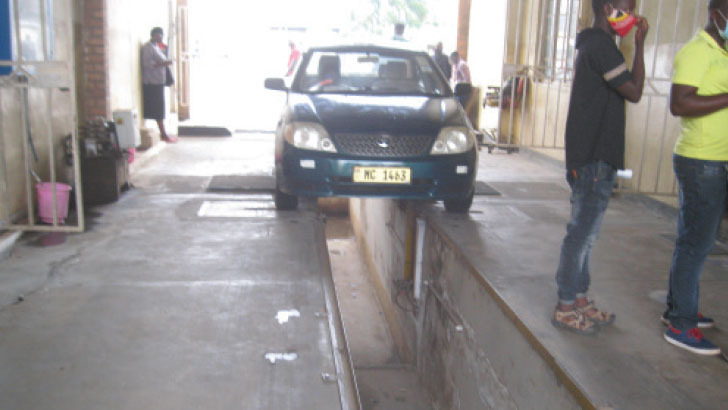Auto services banish dobadobas
Long queues, a buzzing band of brokers running errands for illicit fees and unexplained low revenue have become familiar headaches for the Directorate of Road Traffic and Safety Services (DRTSS).
Inefficiencies in the provision of documents for motorists make clients desperate enough to pay hefty fees to middle men and women commonly known as dobadobas for services that are supposed to be free of charge.
Leonard Ntonya, regional road traffic officer (North), bemoans the human interference for delays in service delivery and dwindling revenue.
“Recently, we have had some meetings where we tactically agreed to eliminate them. They have brought a huge mess,” he states.

Ntonya calls for unity among the department staff and service seekers in the fight to kick out dobadobas on the prowl.
Dobadobas usually take advantage of the system’s sluggishness as well as clients desperation to jump the queue and low awareness of how road traffic transactions work.
Clients with knowledge and connections in the DRTSS system easily sidestep the gang ready to cash in.
“Literacy levels in Malawi are low. Malawians who do driving as a career are mostly the people who have failed elsewhere and want to try driving. These dobadobas are even connected to the villages where our clients come from. Some people think they work here,” says Ntonya.
Dobadobas provide unsolicited services on behalf of clients and some DRTSS staff, pretence that no transaction can succeed without their hidden hand.
“There is a belief that we deliberately fail people during tests so they can pay bribes. That must change. Most clients fail because they don’t read the test or exam questions correctly. We have to change that culture. The reading culture is lacking,” he explains.
Learners in need of driving licences have to participate in person in automated tests that require matching fingerprints. The new system has fast-tracked the issuance of driving licences.
Madalitso Gunsaru, regional road traffic officer for the Eastern Region, says: “Even ourselves did not believe that you could do a road test today and get a licence card the same day.
“Before the automated system, it could take three or six months—even a year—to get a licence.”
Clients who cannot read or write in English take Chichewa tests on the automated board.
“For those who have not gone to school, we will need to use the audios,” says Gunsaru.
DRTSS allows appointed proxies to transact on behalf of clients. A proxy represents no more than two clients.
Gunsaru notes that DRTSS is serious to eradicate dobadobas while other equally infested government departments are looking away.
“There was too much human interference in our transactions. What we are picking here is that the automated system has cleared human interference,” he says.
The Road Traffic switched to cashless transactions following the rollout of the Malawi Traffic Information System (Maltis).
Corrupt transactions by dobadobas were expected to end with the introduction of the new system.
“There has been an increase in revenue. We believe the upgraded system helped to seal all holes where revenue was filtering into wrong hands. All manual transactions have been removed and replaced with automation,” Gunsaru says.
As the system has cut lead time to just five minutes on the counter, dobadobas are looking for loopholes and alternatives to stay in business.
A handful of them are still lingering in DRTSS offices in Mzuzu, Lilongwe, Zomba and Blantyre.
Peter Chimoto, regional chief traffic officer for the Centre, squarely blames clients who prefer engaging dobadobas in handling road traffic services.
He urges clients to always consult DRTSS’ uniformed staff for help.
“Our clients must meet personnel in uniform. The road traffic doesn’t recognise dobadobas, however they are still persistent,” Chimoto says.
DRTSS has established satellite centres to decongest its services, making the dodgy middlemen and women nearly redundant.
As the queues are becoming shorter, clients no longer endure long waits for essential road traffic services.
A dobadoba in Mzuzu says the go-betweens’ primary task is to “help you skip those queues”.
And his client unpacks why he opts for the bemoaned dobadobas.
“Now the situation is a bit difficult for the dobadobas, but they help. When your vehicle is not fit or you don’t want to fail tests for driving licences, they connect you with DRTSS staff so that they can bypass the system,” he explains.
An opinion is widespread that dobadobas take advantage of desperate people from remote rural areas.
However, even urban dwellers, who are presumed to be aware of the procedure, also pay to beat the queue.
Another client said: “The system is now a bit quicker and simpler. People are just used to corruption. They want to be faster.
“The dobadobas normally overcharge and disappear in thin air, leaving someone wondering around. They will share the difference with the big guys inside. Now things are changing.”
While the department is tightening its systems, the dobadobas reduced to barely transacting on behalf of unsuspecting clients still have more tricks to play.
They still linger in DRTSS corridors, reaping where they do not sow.
How long they will hang on to their shadowy business rests on DRTSS determination to bring sanity to its work spaces nationwide.






One Comment